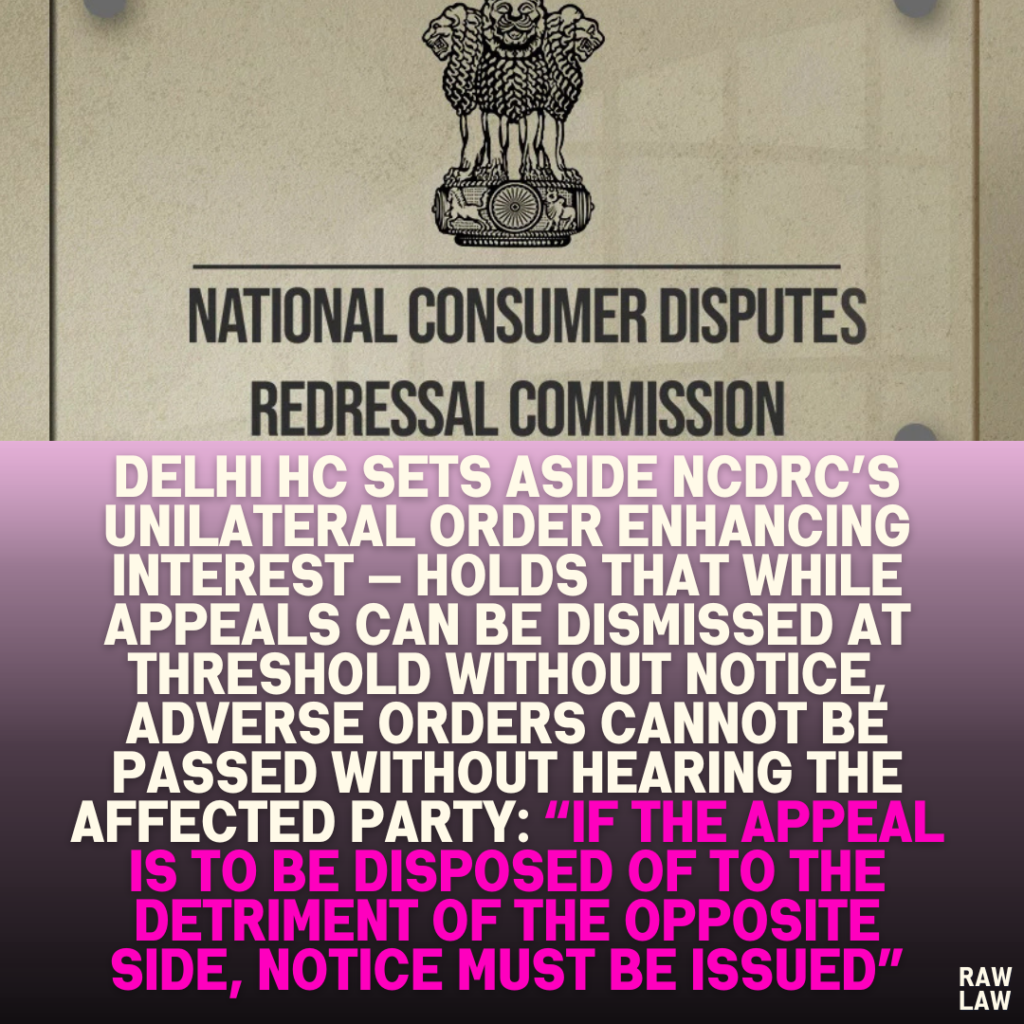Court’s Decision
The Delhi High Court allowed the civil miscellaneous petition challenging the order dated 27.12.2024 passed by the National Consumer Disputes Redressal Commission (NCDRC). The NCDRC’s order, which modified the interest component in favour of the complainant without issuing notice to the opposite party, was set aside. The Court restored First Appeal No. 982/2024 and directed that it be reheard after giving both parties an opportunity to be heard. The parties were directed to appear before the NCDRC on 30.05.2025.
Facts
- A consumer complaint was filed before the State Commission, New Delhi.
- The State Commission, by judgment dated 11.11.2024, directed the opposite party to refund ₹35,21,168/- with interest at 6% per annum from the date of each payment till the date of judgment (11.11.2024), provided the amount was paid by 11.01.2025. In case of delay, interest was to accrue at 9% per annum till realization.
- Additionally, ₹2,00,000/- was awarded as compensation for mental agony and ₹50,000/- as litigation costs.
- The complainant, dissatisfied with the 6% interest, filed an appeal before the NCDRC (FA No. 982/2024).
- On 27.12.2024, the NCDRC disposed of the appeal, enhancing the interest to 9% p.a. with a penal rate of 12% for delays, and set aside the ₹2,00,000/- compensation. However, this was done without issuing notice to the opposite party.
- The opposite party approached the Delhi High Court under Article 227, alleging that it was never served notice nor given an opportunity to be heard.
Issues
- Whether the NCDRC could lawfully enhance the interest rate and modify the State Commission’s order without issuing notice to the opposite party.
- Whether disposal of an appeal without hearing the opposite party violates principles of natural justice.
Petitioner’s Arguments
- The appeal before the NCDRC was disposed of on the very first date (27.12.2024) without any notice to the petitioner.
- The petitioner had no knowledge of the appeal proceedings and was never served notice.
- The NCDRC’s order was passed to the detriment of the petitioner, without affording it an opportunity to be heard.
Respondent’s Arguments
- The respondent’s counsel fairly admitted that the NCDRC took up the appeal on 27.12.2024 for the first time and passed the final order on the same day.
- He further admitted that no notice had been issued to the opposite party and the appeal was decided unilaterally.
Analysis of the Law
- The High Court reaffirmed that an appellate forum like the NCDRC may dismiss an appeal at the threshold without notice if it finds no merit.
- However, if any modification or alteration is proposed—particularly one that affects the rights of the opposite party—issuance of notice becomes mandatory.
- Disposing of an appeal that results in an adverse modification for one party without giving them an opportunity to be heard is a violation of the principles of natural justice.
Precedent Analysis
Although no specific precedents were cited in the judgment, the ruling rests squarely on the settled principle of natural justice—audi alteram partem (no one should be condemned unheard). The Court highlighted that unilateral adjudication to the detriment of a party without issuing notice is impermissible.
Court’s Reasoning
- The High Court emphasized that “before disposing of the appeal to the detriment of the opposite side, it should have issued notice.”
- It acknowledged the email from the NCDRC Registrar confirming that the only date of proceedings was 27.12.2024, indicating the absence of prior notice or hearing.
- The Court concluded that the appeal had been decided unilaterally and adversely impacted the opposite party, thereby violating procedural fairness.
Conclusion
The Delhi High Court allowed the petition, set aside the order of the NCDRC dated 27.12.2024, and restored First Appeal No. 982/2024. It directed both parties to appear before the NCDRC on 30.05.2025. The NCDRC was instructed to hear the appeal afresh after giving both parties a fair opportunity to present their arguments.
Implications
- The judgment reinforces the essential requirement of adhering to principles of natural justice in appellate proceedings.
- It serves as a caution to quasi-judicial bodies such as the NCDRC that even procedural shortcuts in favour of efficiency cannot override the right to be heard.
- The ruling ensures that parties are not adversely affected without due process, especially in cases involving monetary obligations and modifications of adjudicated terms.




Pingback: Bombay High Court Dismisses Writ Against Private Developer for Alternate Permanent Accommodation — “Developer Not ‘State’ Under Article 12; Dispute Is Private and Contractual, No Writ Under Article 226 Lies” - Raw Law